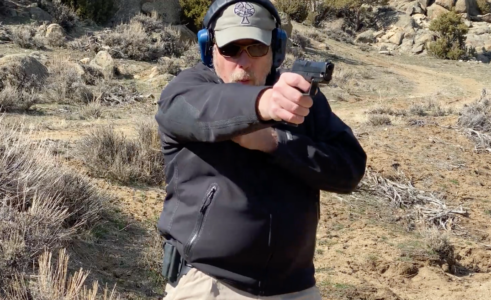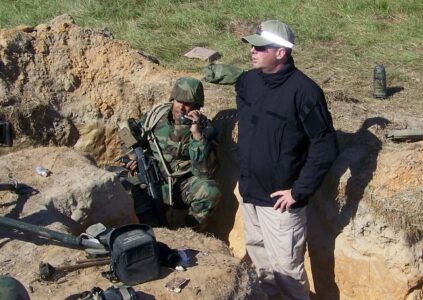Navigate This Post
In our digital age, a consumer can easily search for recommended plumbers, electricians, contractors and auto mechanics, but what about firearms instructors? For many years, we have been asked by our audience; “How do I find a good firearms instructor?” or “How can I find a good shooting school?”
The truth is that those questions are not easy to answer. Unlike plumbers and contractors, there is no universal clearing house for firearms instructors with hundreds or thousands of customer reviews and referrals. For many years, my stock answer has been simply to take an entry level course, get some experience and then go from there. However, I believe the time has come for me to be more specific.

A good firearms instructor must be able to do as well as teach.
Help us combat Censorship by joining our Newsletter
Finding Truth in a World of Bulls**t
One reason that it can be difficult to find a professional, first-rate firearms instructor is due to the fact the arena of firearms is extremely ego driven. Yes, most man-centric endeavors are driven by ego, but the gun world is top of the list.
Thanks to the advent of the internet and socialist media, any spaz with a smartphone can start a channel or create an Instagram account and list themselves as a “Firearms Instructor”. I do not envy the new gun owner or recent convert who has to wade through a sea of bulls**t trying to find a genuine instructor who is not a narcissistic Instagram model.
That being said, I will do my best to offer some advice to aid the recent convert or the first time gun buyer in seeking out professional instruction. While the list may not be exhaustive, it should provide a foundation from which to begin.
FREE COURSE
Master the Fundamentals with 7 Training Tips That Could Save Your Life
Sign up now and get started with the course.
Personal Recommendations
The gun world is not that much different than that of home building or auto repair. The best advice you can get about a training school or firearms instructor will come from a trusted first person review. Consider your peer group, your close friends or perhaps your relatives. Whom do you trust to give you advice? You should know who will speak sincerely and who likes to embellish their stories. Once you have answered that question, ask that person or people about whether they have taken firearms training. If you have more than one person to ask, all the better.
Personal recommendations are not an exact science, but they are far better than internet forum gossip or the horse excrement posted on socialist media. Ask your acquaintance(s) a lot of questions; why did they pick that school? Would they go back? Was it worth the money and the time? Have they attended different schools? What was the difference between them?
Beginners Checklist
Perhaps you are the lone gun person in your peer group. That sucks, but we’ll drive on. Hopefully, the following list will provide you with a solid foundation.
- Amatuer or Professional: Is the school/trainer a part-time, once in a while gig or a dedicated, full-time enterprise. Has the trainer made their living teaching people or do they just do it as a hobby? Most locales do not have a client base to support weekly or even monthly training courses, but you are looking for an instructor with dedicated teaching experience.
- Customer recommendations: are their public reviews and recommendations available for potential students to read? No one in real life gets 100 percent positive reviews. Some clients/customers are impossible to please. Don’t let a couple of 1 star reviews completely turn you off. However, there should be more positive than negative.
- Instructor Vitae: Does the instructor or instructors provide a bio with a professional instructor vitae that potential students can read? No, “gun enthusiast” is not a qualifying endorsement.
- Price Point: For a first-rate, professional instructor, their time is valuable as they have invested tremendously in education, training, and business set up. A cheap, discount training class might seem attractive, but you always get what you pay for. You don’t go to McDonalds and expect filet mignon.
Naturally, this checklist is one that you can apply before you sign up and pay for a class. After you have paid and begun your training it is too late to change your mind. Nonetheless, we will offer a few criteria for evaluating a firearms training course as you proceed through it.
Honest Course Evaluation
If you are a first time student in a firearms course, you truly have no basis for comparison. That’s not a put down, it is just the honest truth. You might think it is the best class you ever took or the worst. But what criteria are you using for your evaluation?
- Safety Briefing: Firearms are tools, not unlike a power drill or a chainsaw. Used properly, firearms are safe and effective. Used improperly, people can get hurt or die. Your instructor should go over the 4 Universal Firearms Safety Rules in the classroom and answer questions. They should also do a quick refresher of the Rules before live fire commences. Dedicated first responders should be identified and the location of the first aid/trauma kit should be pointed out. Additionally, no one should be allowed on a live-fire range without both Eye and Ear protection.
- A good instructor will engage the audience and ensure that everyone is tracking and they will take the time to gauge the class’s understanding of the material. If you are a quick study, have patience as the instructor brings everyone up to speed.
- The only time a live/genuine firearm should be used in a classroom environment is when disassembly/reassembly and maintenance are being taught. Drawing from a holster, proper grip, sight alignment, etc. can all be accomplished with non-firing replicas and dedicated training devices. If an instructor points a live gun at the class and says “It’s okay, it’s not loaded” that indicates a dangerous amatuer. Every quality instructor owns dedicated, non-firing training replicas for classroom demonstrations.
SOTG Instructor Development Manual
The impetus for me to write this review came from my recent work on an Instructor Development Manual. I have been providing professional firearm instruction for more than thirty years and we decided that it was time for Student of the Gun to begin holding Instructor Development Training courses to create first-rate firearms instructors.
As I sat and typed out the manual, it gave me the opportunity to consider all of the good, bad, and ugly firearms training I have experienced over three decades. I have had the privilege to train with the finest firearms trainers the United States has to offer. Occasionally, I have been to events where the instruction was less than stellar, shall we say.
Interested in attending the
SOTG Instructor Development Course?
There are two types of people who will benefit from the just released SOTG Instructor Development Manual; the student and firearms instructors with a desire to provide the highest quality training possible to their students. You might think it odd that a student could benefit from an Instructor Manual. The benefit to a student would be to have a guide or a roadmap that points out the intricacies of professional training and how a professional small arms and tactics instructor should be teaching the material.
Whatever you decide, in the end, when it comes to the safe and effective use of firearms, I hope that you will embrace the motto; you are a beginner once, a student for life.

The Author working as a Small Arms & Tactics Instructor.
About the Author
Paul G. Markel has over thirty years of teaching experience that he has acquired through providing instruction to the Military, Law Enforcement personnel and Citizens nationwide. Mr. Markel has put in his 10,000 hours training and teaching thousands upon thousands of students and has serious opinions about what it takes to become a first-rate instructor.
Professor Paul Markel
Latest posts by Professor Paul Markel (see all)
- Tactical Rifle Tips: Transition Drills - January 5th, 2024
- 40/20/25 Shooting Drill - October 29th, 2023
- Working With Your Body Armor - October 3rd, 2023
- Hi-Point YC9: Yeet Cannon - August 14th, 2023
- Texas Hog Hunting: Day or Night w/ One Rifle - July 25th, 2023
Recent Comments